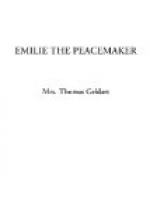Perhaps, had Joe White at this time fallen down and broken his leg, or demanded in any way a great sacrifice of personal comfort from his school-fellow, he would have found it easier to return good for his evil, than in the daily, hourly, calls for the exercise of forgiveness and forbearance which occurred at school. Oh, how many will do great things in the way of gifts or service, who will not do the little acts of kindness and self denial which common life demands. Many a person has built hospitals or alms houses, and has been ready to give great gifts to the poor and hungry, who has been found at home miserably deficient in domestic virtues. Dear children, cultivate these. You have, very few of you, opportunities for great sacrifices. They occur rarely in real life, and it would be well if the relations of fictitious life abounded less in them; but you may, all of you, find occasions to speak a gentle word, to give a kind smile, to resign a pursuit which annoys or vexes another, to cure a bad habit, to give up a desired pleasure. You may, all of you, practice the injunction, to live not unto yourselves. Fred, I say, found it a hard matter to carry out Emilie’s plan towards Joe White, who came back from home more evilly disposed than ever, and all the boys agreed he was a perfect nuisance.
“I would try and make him loveable.” Those words of Emilie’s often recurred to Fred as he heard the boys say how they disliked Joe White worse and worse. So Fred tried first by going up to him very gravely one day, and saying how they all disliked him, and how he hoped he would mend; but that did not do at all. Fred found the twine of his kite all entangled next day, and John said he saw White playing with it soon after Fred had spoken to him.
“I’d go and serve him out; just you go and tangle his twine, and see how he likes it,” said John.
“I will—but no! I won’t,” Bald Fred, “that’s evil for evil, and that is what I am not going to do. I mean to leave that plan off.”
An opportunity soon occurred for returning good for evil Miss Barton had a donkey, and this donkey, whose proper abode was the paddock, sometimes broke bounds, and regaled itself on the plants in the young gentlemen’s gardens, in a manner highly provoking to those who had any taste for flowers. If Joe White had any love for anything, it was for flowers. Now, there is something so pure and beautiful in flowers; called by that good philanthropist Wilberforce, the “smiles of God,” that I think there must be a little tender spot in that heart which truly loves flowers. Joe tended his as a parent would a child. His garden was his child, and certainly it did his culture credit. Fred liked a garden too, and these boys’ gardens were side by side. They were the admiration of the whole family, so neatly raked, so free from stones or weeds, so gay with flowers of the best kind. They were rival gardens, but undoubtedly White’s




